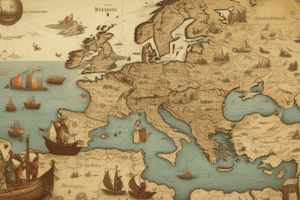Podcast
Questions and Answers
Who was Charlemagne and what was his significance during the Middle Ages?
Who was Charlemagne and what was his significance during the Middle Ages?
Charlemagne was the leader of the Franks who united many Christian lands in western Europe and was declared emperor.
What does the name 'Charlemagne' mean?
What does the name 'Charlemagne' mean?
The name 'Charlemagne' means 'Charles the Great'.
What people lived in Europe more than a thousand years ago and were significant in history?
What people lived in Europe more than a thousand years ago and were significant in history?
The Franks were the people who lived in Europe over a thousand years ago.
What country is named after the Franks?
What country is named after the Franks?
What qualities or roles did Charlemagne possess?
What qualities or roles did Charlemagne possess?
What was the time period of the Middle Ages in Europe?
What was the time period of the Middle Ages in Europe?
Who became the head of the Christian Church during the Middle Ages?
Who became the head of the Christian Church during the Middle Ages?
What economic system became predominant in Europe during the Middle Ages?
What economic system became predominant in Europe during the Middle Ages?
Which king is noted as the most successful during the Middle Ages?
Which king is noted as the most successful during the Middle Ages?
What role did monasteries play during the early Middle Ages?
What role did monasteries play during the early Middle Ages?
Which groups invaded the Roman Empire to initiate the Middle Ages?
Which groups invaded the Roman Empire to initiate the Middle Ages?
What dependency did peasants have on lords within the manorial system?
What dependency did peasants have on lords within the manorial system?
Which religion became the major faith during the early Middle Ages?
Which religion became the major faith during the early Middle Ages?
Study Notes
Middle Ages in Europe (500-1500 CE)
Learning Outcomes
- Analyze and describe events, people, and changes during the study period 500-1500 CE
- Identify significant characteristics of the Middle Ages, including education, inventions, architecture, and economy
- Describe the concept of a king and his role
- Identify fairs, festivals, events, rituals, and sports and games of the early church period
Main Events, People, and Changes
The Middle Ages
- Lasted from 500 CE to 1500 CE
- The Christian Church played a vital role in the history of the Middle Ages
Early Middle Ages
- Germanic tribes invaded the western part of the Roman Empire and formed many small kingdoms
- The invaders eventually converted to Christianity
- The pope and other church leaders became very powerful
- Few people outside the church could read or write
- Monasteries were centers of learning
- Manorialism was the chief economic system of Europe
- Wealthy lords owned most lands, and peasants depended on them for protection
Charlemagne and the Franks
- Charlemagne was a leader of the kingdom of the Franks
- He united many Christian lands of western Europe during the Middle Ages
- Declared emperor and a great warrior
- His name means "Charles the Great"
- The Franks were a group of people who lived in Europe over a thousand years ago
- The country of France was named after them
Studying That Suits You
Use AI to generate personalized quizzes and flashcards to suit your learning preferences.
Description
Explore the events, people, and changes during the Middle Ages in Europe, including education, inventions, architecture, economy, and the role of kings. Identify significant characteristics of the period and cultural practices.




